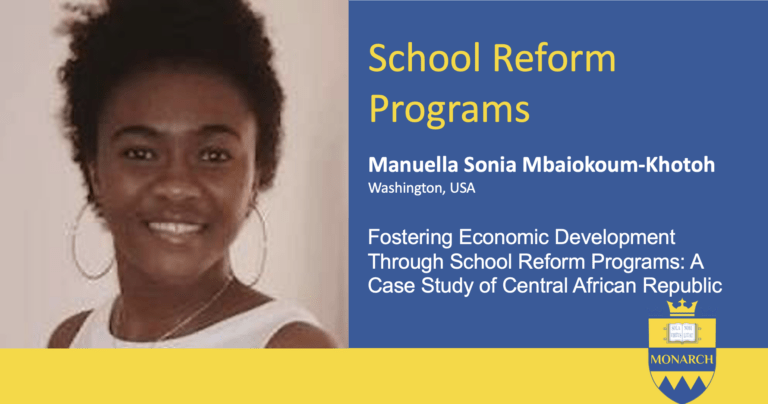Fostering Economic Development Through School Reform Programs: A Case Study Of Central African Republic

Monarch is happy to announce the recent authorized research proposal addressing sustainable economic development through school reform by PhD Candidate Ms. Manuella Sonia Mbaiokoum-Khotoh. The research focuses on the case of the Central African Republic.
The Research
The analysis of economic challenges in developing countries reveals several flaws and dysfunctions including (i) high rates of unemployment; (ii) rising inequality; (iii) disruption of major economic activities due to the pandemic; and (iv) low productity due to poor human capital development (UNICEF, 2021). To address some of these challenges, development efforts, including the Global Partnership for Education, the Malala Fund, and others, have been devoted to the implementation of education reforms to improve quality (Bruns, Macdonald, & Schneider, 2019; Ditlev-Simonsen, 2021). The emphasis on education quality emanates from the reality that it equips students with the necessary skills to enhance national competitiveness, reduce inequality within a country, and eventually foster economic growth (Callender & Dougherty, 2018; Ramirez, 2014). In 2018, the European Commission made the argument that improvements in education are thus necessary to achieve higher income and better environmental decisions (European Commission, 2018). Yet, education remains a privilege beyond reach for millions of children globally, particularly in developing nations such as Afghanistan, Yemen, South Sudan, Somalia, and Haiti (Moloi, Morobe, & Urwick, 2008; Tumwesige, 2020).
To achieve the agenda of sustainable economic growth through education, governments have attempted to reform and implement new school programs into their educational systems to improve education performance and produce social mobility. These educational reforms which focused on enhancing teacher quality, expanding access to education, and emphasizing student-centered learning were effective in improving educational outcomes for students in Finland, Singapore, Chile, and South Korea (Bruns, Macdonald, & Schneider, 2019; Ditlev-Simonsen, 2021; Hiroshi, 2021). These countries have been successful in broadening and accelerating educational development in a short amount of time (Leviin, 2000; Stewart, 2012; Verger, Fontdevila, & Parcerisa, 2019; World Bank, 2019).
The contemplated research will attempt to identify the key factors contributing to the development of efficient K-12 education reforms that could help emerging countries like the Central African Republic improve their economic system. The contemplated research will investigate the path taken by other countries such as Japan that was once destroyed by war and now has become one of the best education systems in the world (Hiroshi, 2021). The contemplated research will explore the analysis of the intersection between education reforms, social justice, and sustainable economic development. Existing academic and scientific literature will be reviewed, as well as interviews with key stakeholders in selected African countries such as Ghana and Tanzania will be completed.
The Researcher
 Ms. Sonia Manuela Jericho Mbaiokoum Khotoh is a Professional PhD Candidate in Economics. She holds a Master in Public Policy and a Bachelor of Business Administration in Finance from the University of Baltimore, USA. At present, she holds the position of Education Specialist at the World Bank Group HD Practice, The Global Partnership For Education in Washington, DC, USA. Previous to that, she was a Monitoring Officer at the University of Baltimore and early was Operations officer at the Embassy of the Central African Republic. She has professional experience in many countries including: Benin, Cameroon, Central African Republic, Nepal, Senegal, USA.
Ms. Sonia Manuela Jericho Mbaiokoum Khotoh is a Professional PhD Candidate in Economics. She holds a Master in Public Policy and a Bachelor of Business Administration in Finance from the University of Baltimore, USA. At present, she holds the position of Education Specialist at the World Bank Group HD Practice, The Global Partnership For Education in Washington, DC, USA. Previous to that, she was a Monitoring Officer at the University of Baltimore and early was Operations officer at the Embassy of the Central African Republic. She has professional experience in many countries including: Benin, Cameroon, Central African Republic, Nepal, Senegal, USA.
